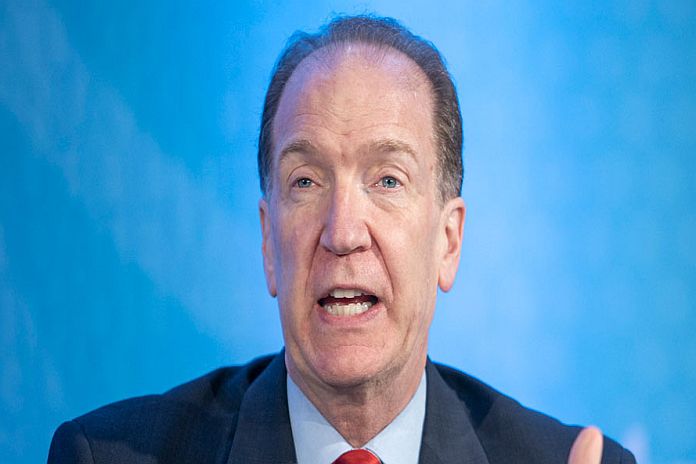Remarks by World Bank Group President David Malpass at the G20 Finance Ministers and Central Bank Governors Meeting – Spring Meetings 2021 – April 7, 2021
By David Malpass
In previous interventions, I’ve provided details on the World Bank Group’s actions in helping countries respond to the COVID-19 pandemic. In 2020, we achieved a record 65 percent growth in commitments; and a rapid doubling of our trade and working capital finance to help fill the banking vacuum that hit private sectors. In 2020, bank-wide commitments topped $100 billion for the first time, and we expect new vaccination operations in 50 countries by mid-year.
COVID-19 will leave lasting scars on developing countries, from closed schools and physical stunting of children to lost jobs, the depletion of savings and assets, and growing debt overhangs. The crisis came on top of persistent development challenges, including stagnant median incomes, fragility and violence, and damage caused by climate change.
In this context, I welcome the G20’s work on supporting the most vulnerable countries and commend the Italian presidency for prioritizing people and the planet.
I’ll focus [today] on climate, debt, and resource needs.
Last week, we presented the main elements of our Climate Change Action Plan. It includes ambitious new targets for climate financing and steps to have as much impact as possible in improving the trajectory of greenhouse gas emissions and saving lives and livelihoods through adaptation.
The plan is integrating climate and development, expanding our diagnostics, increasing the focus on results, and supporting countries with their NDCs and Long-Term Strategies. We are working to help countries wind down subsidies to carbon-intensive industries and secure a just transition away from coal. We’ve invited close collaboration with the International Monetary Fund (IMF) and other partners, and our financing flows will be aligned with the Paris Agreement.
On debt, we welcome a decision by the G20 to extend the DSSI through 2021. The World Bank is also working closely with the IMF to support the implementation of the G20 Common Framework.
In both these debt efforts, greater transparency is an important element: I urge all G20 countries to disclose the terms of their financing contracts, including reschedulings, and to support the World Bank’s efforts to reconcile borrower’s debt data more fully with that of creditors.
Participation by commercial creditors and fuller participation by official bilateral creditors will be vital. I urge all G20 countries to instruct and create incentives for all their public bilateral creditors to participate in debt relief efforts, including national policy banks. I also urge G20 countries to act decisively to incentivize the private creditors under their jurisdiction to participate fully in sovereign debt relief efforts for low-income countries.
Debt relief efforts are providing some welcome fiscal space, but IDA countries need major new resources too, including grants and highly concessional resources. From April to December 2020, the first DSSI period, our net transfers to IDA and LDC countries were close to $17 billion, of which $5.8 billion were on grant terms. Our new commitments were almost $30 billion, making IDA19 the single largest source of concessional resources for the poorest countries and the key multilateral platform for support.
To recover from COVID-19, much more is needed, and we welcome the G20’s support for advancing IDA20 by one year. You know many of the arguments for IDA resources, so I’d like to conclude with a word on balance sheet optimization. In IDA18, we implemented a major optimization by transforming IDA into a AAA market participant and adopting a hybrid financing model. In IDA19, $1 in donor contribution led to $3.50 in IDA financing, nearly double that just half a decade earlier.
We will seek ways to further optimize our balance sheet while protecting IDA’s AAA rating. At the same time, strong donor contributions are necessary to maintain concessionality. That’s the key point I’d like to leave you with – strong donor contributions are necessary to maintain concessionality to support the poorest countries.





